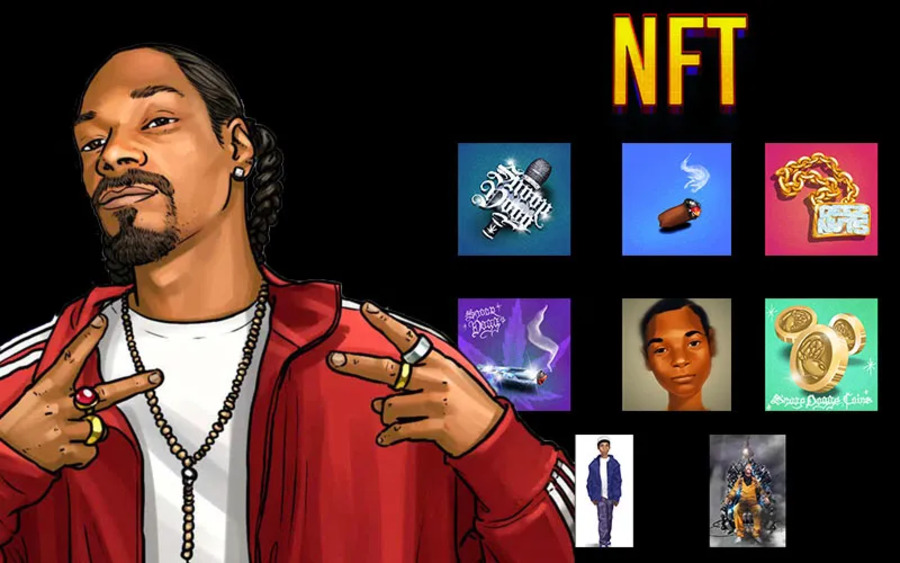
Introduction
Non-fungible tokens, or NFTs, have quickly gained popularity as a new way of representing ownership and authenticity of digital assets. While initially used in the art world, NFTs have since expanded to other areas, including celebrity culture. In this article, we will explore how celebrities are embracing blockchain technology and NFTs, and the impact this is having on the entertainment industry.
Celebrities and NFTs: The Connection
Celebrities are no strangers to the world of cryptocurrency and blockchain. Many celebrities, including Ashton Kutcher, Nas, and Paris Hilton, have invested in cryptocurrency and blockchain startups. With the rise of NFTs, celebrities have also begun to embrace the technology as a new way to monetize their brand and engage with fans.
One of the primary ways in which celebrities are using NFTs is through the sale of unique digital assets, such as music, artwork, and even virtual experiences. These assets are represented by NFTs, which provide a way for celebrities to prove ownership and authenticity of their digital creations.
For example, in March 2021, musician Grimes sold a collection of NFTs for over $6 million, including an NFT that contained a video clip of her performing a new song. Other celebrities, including Mark Cuban and Snoop Dogg, have also embraced NFTs and sold their own collections of digital assets.
Impact on the Entertainment Industry
The use of NFTs in celebrity culture is having a significant impact on the entertainment industry. One of the primary benefits of NFTs is that they provide a new revenue stream for artists and celebrities, who can now sell their digital creations directly to fans. This has the potential to disrupt traditional models of distribution and monetization in the entertainment industry, which have often been controlled by record labels, studios, and other intermediaries.
NFTs also provide a new way for celebrities to engage with fans and build their brand. By offering unique digital assets that are authenticated through blockchain technology, celebrities can create a sense of exclusivity and scarcity around their brand, driving up demand and increasing fan engagement.
In addition to these benefits, the use of NFTs in celebrity culture also raises important questions around ownership and authenticity of digital assets. As more celebrities begin to embrace NFTs, it will be important to establish standards and best practices for the creation and trading of these assets, ensuring that they are authentic and legally protected.
Challenges and Limitations
While the use of NFTs in celebrity culture has significant potential, there are also challenges and limitations to consider.
One of the primary challenges is the risk of fraud and scams. With the rise of NFTs, there has been an increase in fake NFTs and fraudulent sales. It is important for buyers to verify the authenticity of NFTs before making a purchase, and for creators and marketplaces to take steps to ensure the legitimacy of their offerings.
Another challenge is the potential for market saturation. As more celebrities begin to embrace NFTs, the market for these assets could become overcrowded, leading to a decrease in demand and value.
Finally, there are concerns around the environmental impact of NFTs. The energy consumption associated with blockchain technology has been a topic of concern, particularly as the use of NFTs and other blockchain applications grows. As more celebrities begin to embrace NFTs, it will be important to consider the environmental impact of these transactions.
Areas where celebrities are using NFTs
Beyond the sale of digital assets, NFTs are also being used by celebrities to create unique virtual experiences for fans. For example, in June 2021, rapper Lil Uzi Vert announced that he had purchased a planet called WASP-127b and would be selling access to it as an NFT. Fans who purchased the NFT would be able to own a piece of the planet and participate in virtual events and experiences related to it.
This use of NFTs to create virtual experiences provides a new way for celebrities to engage with fans and build their brand in the digital space. It also has the potential to create new revenue streams, as fans are willing to pay for unique and exclusive experiences.
Another area where NFTs are impacting celebrity culture is in the realm of sports. Athletes are beginning to embrace NFTs as a way to monetize their personal brand and connect with fans. For example, NBA player Spencer Dinwiddie created an NFT investment platform called Calaxy, which allows fans to invest in and support their favorite athletes through NFTs.
The use of NFTs in sports has the potential to disrupt traditional models of athlete endorsement and sponsorship, as fans can now invest directly in their favorite athletes and benefit from their success. It also provides a new way for athletes to monetize their brand beyond their performance on the field or court.
One of the most notable examples of celebrities embracing NFTs is the musician Grimes. In March 2021, Grimes sold a series of digital art pieces as NFTs for a total of nearly $6 million. The art pieces included one-of-a-kind videos and images, as well as exclusive music tracks. This sale not only demonstrated the potential for NFTs to generate significant revenue for artists, but it also highlighted the unique nature of digital art as a form of expression.
Another example is the musician Deadmau5, who created a series of NFTs called “The World of Cube” that allowed fans to own a piece of his virtual reality gaming world. The NFTs included unique in-game assets and experiences, and they provided a new way for fans to connect with Deadmau5 and his music in a more immersive way.
Beyond musicians, actors and other celebrities are also beginning to explore the potential of NFTs. For example, actor William Shatner released a series of NFTs in July 2021, including one that featured an image of his Star Trek character, Captain Kirk. The NFTs sold for a total of nearly $600,000, and they provided a new way for fans to connect with Shatner and his iconic character.
The use of NFTs in celebrity culture is still in its early stages, but it is clear that this technology has the potential to disrupt traditional models of celebrity endorsement and sponsorship. By allowing fans to own a piece of their favorite celebrity’s brand, NFTs provide a new level of engagement and ownership that was previously impossible in the digital space.
Conclusion
However, as with any emerging technology, there are also challenges and limitations to consider. One challenge is the environmental impact of NFTs, as the energy required to create and sell them can be significant. Additionally, the exclusivity of NFTs can be problematic for some fans who may not be able to afford to participate in the market.
Despite these challenges, it is clear that the use of NFTs in celebrity culture is a growing trend that has significant potential for disruption and innovation in the entertainment industry. As more celebrities experiment with this technology and explore its potential, we can expect to see continued growth and evolution in this area.
I’m a highly experienced and well-respected author in the field of cryptocurrency. I have been writing about Bitcoin, Ethereum, and other digital assets for over 5 years. In addition to my career as an author, I’m also a highly sought-after keynote speaker and consultant on all things crypto and I’m passionate about helping people understand this complex and often misunderstood industry.
